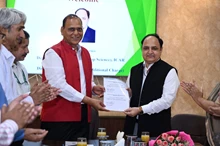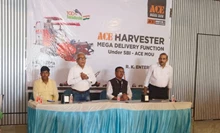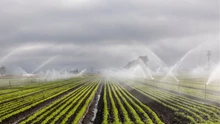
The second day of the Global CEO Conclave 2024, organized by the Wheat Products Promotion Society (WPPS), continued to build on the impactful discussions initiated on the inaugural day. With the global wheat market projected to reach $258.7 billion by 2027 and facing challenges like climate change and fluctuating demand, the event provided a crucial platform for addressing these issues.
The event featured focused business sessions and panel discussions that brought together over 50 speakers from India and abroad to delve into critical aspects of the wheat industry. The spotlight was on flour fortification, which has the potential to reduce micronutrient deficiencies in 30% of the global population, wheat economics amidst market volatility, and India’s significant role in enhancing global food security, as it is the world’s second-largest wheat producer.
Business Session 1: Nourishing India: The Role of Fortified Flour in Public Health
This session explored the transformative potential of fortified flour in improving public health. Industry leaders, including Sanjeev Asthana, CEO of Patanjali Foods, highlighted current trends and prospects in flour fortification, underscoring Patanjali Foods' innovative initiatives to meet nutritional needs across diverse demographics. Dr. Anirudha Chhonkar from CIFTI FICCI provided valuable insights into the regulatory frameworks governing flour fortification, emphasizing the need for regulatory coherence to effectively scale up fortification efforts.
Dr. Suresh Itapu, representing the Soy Food Promotion & Welfare Association, stressed the importance of protein fortification in wheat products, advocating for sustainable practices to enhance dietary diversity. Kunj Gupta, Director of Bhawani Roller Flour Mills Pvt. Ltd., shared best practices in fortification from a miller’s perspective, highlighting the role of technology in maintaining product quality. Suman Gupta from AQC Chem Lab Pvt. Ltd. discussed advancements in ingredient technology for fortification, bridging the gap between scientific innovation and industry application. Tony Senanayake, CEO of Fortify Health, concluded the session with insights on NGO-led initiatives in fortification and their impact on improving global nutritional outcomes.
Business Session 2: Wheat Economics: Demand, Supply, and Pricing
This session provided a comprehensive analysis of global wheat market dynamics. Arnaud Petit, Executive Director of the International Grain Council, offered an overview of global demand and supply dynamics, emphasizing resilience amidst economic shifts. Somnath Chatterjee from ITC Ltd. - Foods Division highlighted crucial supply chain mechanisms for optimizing efficiency and mitigating risks. Sumit Gupta, CEO of Asia Business at McDonald Pelz Global Commodities, discussed adaptive pricing strategies in response to market volatility.
Leif Carlson, Director at Cereals Canada, showcased Canada’s role in the global wheat trade, focusing on quality standards and market competitiveness. Ajay Goyal, Chairman of WPPS, stressed the importance of leadership in promoting wheat products and enhancing supply chain resilience. Ashish Chaturvedi, General Manager at Olam Agri India Pvt. Ltd., provided a global perspective on wheat supplies, emphasizing the need for collaborative approaches for sustainable development.
Business Session 3: Wheat for Peace: India's Role in Global Food Security
This session highlighted India’s significant contributions through technological advancements and supply chain resilience. Dr. Ratan Tiwari from ICAR-Indian Institute of Wheat and Barley Research emphasized India’s efforts to enhance wheat productivity and quality. Prof. Arun K. Joshi from CIMMYT discussed global production trends and the critical role of innovation in addressing food security challenges.
Shweta Saini from Arcus Policy Research explored technologies in crop estimation, which are vital for optimizing agricultural productivity. Khalid Khan from ITC Limited highlighted private sector contributions to India’s wheat supply chain. Garima Jain from LDC India emphasized global wheat quality standards. Raju Kapoor from FMC Corporation discussed building resilient supply chains. Jatin Singh from Skymet Weather Services focused on climate change resilience, and Deepak Pareek from HnyB Tech-Incubations presented strategies for wheat storage and loss prevention.
Business Session 4: Innovations and Challenges in the Wheat Products Supply Chain: From Flour to Consumer
The day concluded with a session exploring advancements in processing, milling technologies, and bakery product development. Anand Ramanathan from Deloitte analyzed the evolving landscape of wheat processing and technological integration. Biren Palani from Stern Ingredients Pvt. Ltd. discussed ingredient innovations for enhancing product differentiation.
Ashish Bhatnagar from Grupo Bimbo focused on procurement strategies. Sundeep Waghray from General Mills India showcased innovative bakery mixes. Raghav Gupta from Mohini Corporation Pvt. Ltd. forecasted future milling trends. Shorya Kapoor from The Cyprus – Assocom Foods Pvt. Ltd. shared insights on baking innovations. Shaishav Mittal from Lovely Bake Studio discussed retailing strategies, and Nikunj Khandelwal from Khandelwal Group presented solutions for mill management.
Ajay Goyal, Chairman of WPPS, expressed optimism about the conclave’s outcomes, emphasizing the critical role of fortification in public health and global food security. He remarked, “The insights shared underscore our commitment to innovation and collaboration in the wheat industry. Discussions on fortification and economics provide a blueprint for sustainable growth.” Goyal concluded, “Moving forward, the strategies discussed will guide our efforts to promote wheat industry growth, foster innovation, and maximize contributions to global food security.”
The Global CEO Conclave 2024, under the theme "WPPS Global CEO Conclave Wheat and Wheat Products Vision 2030: Trade Dynamics, Trends, and Technologies," concluded with a synthesis of profound insights and strategic recommendations aimed at shaping the future of the global wheat industry. The event, hosted by the Wheat Products Promotion Society (WPPS), brought together key industry leaders, policymakers, and experts to discuss and address the evolving landscape of wheat and wheat products. The recommendations formulated during the conclave reflect a collective vision for propelling the industry forward into a more dynamic, innovative, and sustainable era.
Enhancing Fortification Technologies through Collaborative Research
One of the pivotal recommendations highlighted during the conclave was the need to foster collaborative research initiatives to enhance fortification technologies. The wheat industry recognizes the importance of addressing global nutritional challenges by improving the nutrient profile of wheat products. By investing in research and development, stakeholders aim to develop advanced fortification techniques that can effectively address micronutrient deficiencies, particularly in vulnerable populations. This includes the integration of essential vitamins and minerals into wheat products, which can significantly contribute to global food security and public health.
The conclave underscored the importance of collaboration between governments, research institutions, and industry players to drive innovation in fortification technologies. By pooling resources and expertise, the wheat industry can develop scalable solutions that not only meet regulatory standards but also cater to the growing consumer demand for healthier and more nutritious food options. This collaborative approach is essential for ensuring that the benefits of fortification technologies reach a broad spectrum of the global population.
Advocating for Sustainable Agricultural Practices
The theme of the conclave emphasized the critical role of sustainable agricultural practices in ensuring the long-term viability of the wheat industry. As the industry faces the dual challenge of increasing production to meet rising demand while minimizing environmental impact, the conclave highlighted the need for policy frameworks that support sustainable farming. Recommendations included promoting the adoption of eco-friendly fertilizers, efficient water management systems, and precision agriculture technologies that enhance productivity while reducing the ecological footprint of wheat production.
Policymakers were urged to develop and implement regulations that encourage sustainable practices and provide incentives for farmers to adopt environmentally friendly technologies. By aligning policy initiatives with sustainability goals, the wheat industry can significantly reduce its carbon footprint, conserve natural resources, and contribute to global efforts to combat climate change. This approach not only ensures the sustainability of wheat farming but also enhances the resilience of the entire agricultural sector.
Strengthening International Partnerships for Resilient Supply Chains
In light of the theme focusing on trade dynamics and trends, the conclave placed significant emphasis on the importance of strengthening international partnerships. The global wheat supply chain is characterized by its complexity and interdependence, with production, processing, and distribution spanning multiple countries. The conclave's recommendations called for enhanced cooperation and coordination among nations to build resilient supply chains that can withstand disruptions caused by geopolitical tensions, economic fluctuations, and climate-related challenges.
By fostering international collaboration, the wheat industry can ensure a stable and reliable supply of wheat and wheat products, even in the face of global uncertainties. This includes establishing trade agreements that facilitate the smooth flow of goods, sharing best practices, and investing in infrastructure that supports efficient logistics and distribution. Strengthening these partnerships is crucial for maintaining the integrity and stability of the global wheat market, thereby securing food supplies for populations worldwide.
WPPS’s Commitment to Innovation and Sustainability
The Wheat Products Promotion Society (WPPS) remains dedicated to advancing these initiatives through its ongoing efforts in research, advocacy, and industry collaboration. WPPS plays a crucial role in driving the industry's vision for 2030 by supporting research projects that enhance fortification technologies, advocating for policies that promote sustainable agricultural practices, and fostering international partnerships to strengthen supply chains.
WPPS's commitment to these goals reflects its broader mission to support the wheat industry’s evolution toward a more innovative, sustainable, and inclusive future. Through its initiatives, WPPS aims to create a thriving wheat sector that meets the demands of today's market and addresses the challenges and opportunities of the coming decade.
The Global CEO Conclave 2024 provided a comprehensive roadmap for the future of the wheat industry, with recommendations that emphasize innovation, sustainability, and collaboration. By embracing these recommendations, industry stakeholders can work together to ensure a prosperous future for the global wheat sector, one that benefits producers, consumers, and the environment alike. As the wheat industry moves forward, the insights and recommendations from the conclave will serve as a guiding framework for achieving lasting growth and sustainability, in line with the vision for 2030.













